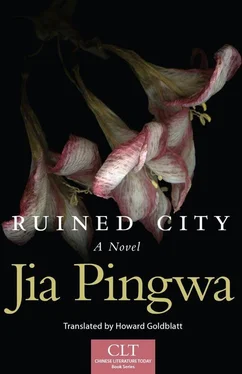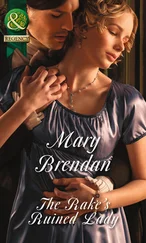But when he went home and told Tang Wan’er, she hit the roof: “What do you think you’re doing, searching for the new world? You just don’t get it, do you! Zhuang Zhidie is back in town, but you don’t seem to be in any hurry to go see him. Do you plan to wait till he sees Jing Xueyin and blows up when everything is out in the open?”
Seeing what a mistake he had made, he thumped his head with his fists.
“How’s this?” she said. “We’ll host a meal in his honor.”
“Do you think he’d come?”
“We’ll get Meng Yunfang to invite him. If all goes well, he’ll come. If not, that will be the end of your editorial office dream, and you won’t have to suffer any more humiliation.”
So Zhou Min went to talk to Meng, who then went to see Zhuang, and returned with the news that the invitation had been accepted, which thoroughly delighted the couple, who then busied themselves over the next few days getting ready. They settled on a date: July 13.
. . .
On the morning of the thirteenth, Zhou Min went into the kitchen as soon as he was up. Since they were living in a temporary residence, they had few of the items they would need, so he went to a local restaurant and rented three bowls, ten large plates and five small ones, a bamboo steamer, and an earthenware pot. Back home, Wan’er swept the floor and the steps outside; she placed Zhuang Zhidie’s novels and a collection of essays she’d bought on a table and asked Zhou where he had put the Tongguan map they’d brought from home.
“With all we have to do, what do you want that for?”
“To tack up on the wall,” she said.
Zhou Min thought for a moment. “Aren’t you the sly fox!” He pinched her on the bottom. With a yelp, she coquettishly lifted a corner of her skirt to show him the bruise, then announced that she’d done all she was going to do. Now it was time to get herself ready. As he was cleaning a fish, she modeled a red dress for him; she then changed into a black skirt, and wound up trying on everything — blouses, shoes, necklaces, stockings — one item after another.
“You’re like a mannequin,” Zhou said. “You’d look good in rags. Zhuang Laoshi is a highly regarded writer, whom we’re meeting for the first time, so the simpler the better.” After choosing a yellow outfit from the pile of clothes on the sofa, she powdered her face and then concentrated on her eyes and lips, finishing not long before Meng Yunfang and his wife arrived with a bottle of osmanthus liquor and a bag of apricots. “I said not to bring anything,” Zhou Min said. “You shouldn’t have done that.”
Xia Jie poked him on the forehead. “The bottle is for Wan’er,” she said, “and apricots are Zhuang Laoshi’s favorite. I didn’t think you’d be aware of his likes and dislikes. Where is she? I want to see our lovely little sister!”
Tang Wan’er rushed out to greet her guests. “You can look,” she said, “but I’m afraid you won’t like what you see.”
“What’s with this ‘little sister,’” Zhou Min said disapprovingly. “She needs to call you ‘shimu’—‘teacher’s wife.’”
“Please don’t call me that,” Xia Jie said. “She’s every bit the rare beauty I thought she’d be.” Lively chatter between the two women commenced: That’s a lovely outfit. You’re so young, what cosmetics do you prefer? Have you ever tried a breast-enlargement pump?
After a moment, Wan’er said, “Zhou Min, you’re in charge. I’m going to play chess with Xia Jie.” She picked up the chess pieces and board and went upstairs to the garret with her guest. The landlord had taken his family on vacation three days before, locking the three upstairs bedrooms but leaving open the terrace, which was furnished with a stone table and four drum-shaped stone chairs. They sat down and played, interspersed with conversation and an occasional glance at the street below.
Zhou Min walked up with an offering of tea, sweets, melon, and peaches. “Zhou Min,” Xia Jie said, “I can’t wait to see what delicacies you’ve prepared for us today.”
“I’m afraid I’m going to disappoint you,” he said, “since I’m not much of a cook. I just want to show my appreciation to you.”
“And we didn’t come expecting something grand,” she said. “Just don’t forget us after you’ve become famous.” Then she shouted down to Meng Yunfang, “Hey, you, into the kitchen. None of that ‘laoshi’ business for you, sitting there like a wise, tea-sipping man.”
“I do all the cooking at home,” Meng said. “Do you really expect me to do the same when we go out? Zhuang Zhidie is the guest of honor, while I count for nothing.” Having had his say, he got up to wash his hands, under the watchful eye of the giggling women upstairs.
Zhuang Zhidie was expected at ten o’clock, but there was still no sign of him by ten after. Meng had sliced the pork, fried the meatballs, soaked the wood fungus, pan-fried the fish, and stewed the soft-shelled turtle. “I gave him the right address,” he said, “and this place is easy to find. I’ll run out to the intersection and look around.”
He stood at the sparsely populated intersection for a few minutes before barreling into the lane and heading to the Clear Void Nunnery, where there was no construction work that day. He opened the door, walked in, and was met by an elderly nun who asked him who he was looking for. Master Huiming, he told her. She led him around back to a large hall, the interior of which was so cold that his sweat dried. And since he had come in out of bright sunlight, for a moment he couldn’t see a thing. Eventually, a cot in a corner of the hall, surrounded by nylon mosquito netting, caught his eye. Someone was asleep there. Sensing the awkwardness of the situation, he turned to leave, just as the person woke up.
“Meng Laoshi!”
Meng Yunfang turned back. The sleeper was now sitting up in bed — it was Huiming. Her collar was unbuttoned and her face had a ruddy glow; overall, she looked quite fetching. She parted the netting, but remained sitting on the edge of the bed, barefoot. “Come, sit here,” she said. “Just passing by?”
With an audible gulp, Meng said, “I had a lunch engagement.”
“So you’re not staying,” she said, and then turned to the elderly nun. “You may continue with what you were doing.” The nun smiled, then opened the door and walked out.
An hour later, Meng Yunfang walked out of the Clear Void Nunnery and trotted back to the intersection, where he saw a Magnolia motor scooter parked by the side of the road. It looked familiar, so he inspected it more closely. Some paint had been chipped off the right handlebar, and a large brick was tied to the rear seat. He looked around, and there, in front of a used-book stall, stood Zhuang Zhidie, who spotted him as he walked up. “Come here, Yunfang, look at this. You’ll get a kick out of it.” He pointed to a secondhand copy of Selected Works of Zhuang Zhidie , with Zhuang’s signature and an inscription—“For Mr. Gao Wenxing”—on the title page above the date. That was accompanied by an imprint of his personal seal.
Feeling a sense of embarrassment for Zhuang, Meng fumed, “Who sells a book that was personally presented to him by the author without at least tearing out the title page? Is that all a book by Zhuang Zhidie is worth?”
“Do you know this Gao Wenxing?” Zhuang asked. Meng could not place the name. “He’s one of Zhao Jingwu’s friends,” Zhuang said. “When he met me the other day, he told me what a fan he was and asked for one of my books.” Zhuang then bought the book for what the seller was asking. Beneath the first inscription, he wrote “For Mr. Gao Wenxing — again.” He added the date and where he had signed it: at a secondhand bookstall.
Читать дальше


![Matthew Vincent - [you] Ruined It for Everyone!](/books/216429/matthew-vincent-you-ruined-it-for-everyone-thumb.webp)









